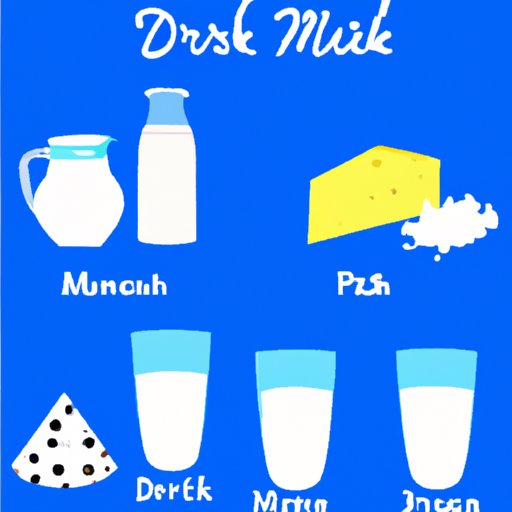Introduction
Dairy products are produced from the milk of cows, goats, sheep, and other mammals. They are rich in essential nutrients, such as calcium, protein, phosphorus, and vitamin A. The most common dairy products include milk, cheese, butter, cream, yogurt, and ice cream. Dairy products are widely available in many countries and are consumed in various forms, such as liquid, powder, or solid.
Overview of Different Types of Dairy Products
Milk is the most popular type of dairy product and is usually obtained from cows, but it can also be derived from other mammals, such as goats, sheep, and buffalo. Milk is a versatile ingredient that is used in a variety of dishes, from breakfast cereals to desserts. It is also available in different forms, such as pasteurized, homogenized, skimmed, or full-fat.
Cheese is another type of dairy product and is made by coagulating milk proteins and separating the solids from the liquid. Cheese can be fresh or aged and comes in various shapes, sizes, and flavors. Common types of cheese include cheddar, mozzarella, Parmesan, blue, and feta.
Butter is a creamy, spreadable dairy product that is made by churning cream. It is often used to enhance the flavor of food, such as toast, potatoes, and vegetables. It is also a key ingredient in baking, as it helps create a light and fluffy texture.
Cream is a thick and creamy dairy product that is made from the fat of milk. It is typically used to add richness and flavor to food, such as soups, sauces, and desserts. Cream is available in a range of consistencies, from heavy whipping cream to half-and-half.
Yogurt is a fermented dairy product that is made by adding bacteria to milk. It is a good source of calcium, protein, and probiotics, which are beneficial bacteria that help maintain the balance of healthy bacteria in the gut. Yogurt is available in a variety of flavors, from plain to fruit-flavored.
Ice cream is a frozen dessert that is made with cream, milk, sugar, and flavorings. It is available in a range of flavors, from vanilla to chocolate, and can be eaten on its own or used as an ingredient in other desserts.
Health Benefits of Dairy Products
Dairy products are a good source of essential nutrients, such as calcium, protein, phosphorus, and vitamin A. Calcium helps strengthen bones and teeth, while protein helps build and repair muscle. Phosphorus and vitamin A are important for maintaining healthy cells, tissues, and organs.
Dairy products can also provide other health benefits, such as improved digestion, weight management, and reduced risk of certain diseases. Research has shown that consuming dairy products can reduce the risk of heart disease, stroke, and type 2 diabetes. Additionally, some studies have found that consuming dairy products can help reduce the risk of certain cancers, such as colorectal cancer.
Potential Health Risks
Despite the health benefits of dairy products, they can also pose potential health risks. For example, some dairy products, such as cheese and ice cream, are high in saturated fat and calories, which can increase the risk of obesity and other chronic diseases. Additionally, some dairy products, such as milk, may contain hormones and antibiotics, which can disrupt the body’s natural hormone balance.
Furthermore, some people may be allergic to dairy products, which can cause symptoms such as itching, hives, swelling, and difficulty breathing. In addition, some people may be lactose intolerant, which means they cannot digest the sugar (lactose) found in dairy products.

How to Properly Store and Prepare Dairy Products
Proper storage and preparation of dairy products is essential to ensure their safety and quality. Dairy products should be stored in the refrigerator at 40°F or below and should be consumed within two weeks of opening. When preparing dairy products, it is important to follow the instructions on the package and to avoid cross-contamination. Additionally, dairy products should be cooked to the proper temperature to ensure they are safe to consume.

Best Dairy Products for Lactose Intolerant People
For those who are lactose intolerant, there are several dairy alternatives available. Milk alternatives, such as almond, coconut, and oat milk, are a good option for those who are lactose intolerant. Additionally, there are several types of dairy-free cheese, such as vegan cheese and soy cheese, that can be used as a substitute for traditional cheese.
Making Dairy Products at Home
Making dairy products at home is a fun and rewarding experience. To make dairy products at home, you will need a few basic tools, such as a cheesecloth, thermometer, strainer, and a large pot. The process involves heating the milk and adding cultures to start the fermentation process. Once the desired consistency is reached, the mixture is strained and allowed to cool. The final product can then be stored in the refrigerator.

Dairy Farming Practices and Their Impact on Quality and Nutrition
The way dairy farms are managed can have an impact on the quality and nutrition of the products they produce. Sustainable dairy farming practices, such as rotational grazing and integrated pest management, can help ensure the health and wellbeing of the animals, as well as the quality of the milk and other dairy products. Additionally, local, organic dairy products are often higher in nutrients than conventional dairy products due to the use of sustainable farming practices.
Conclusion
Dairy products are an excellent source of essential nutrients, such as calcium, protein, phosphorus, and vitamin A. However, it is important to be aware of potential health risks, such as allergies and lactose intolerance, as well as the importance of proper storage and preparation. There are also several dairy alternatives that can be used by those who are lactose intolerant. Finally, sustainable dairy farming practices can help ensure the quality and nutrition of dairy products.


